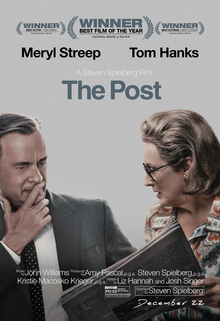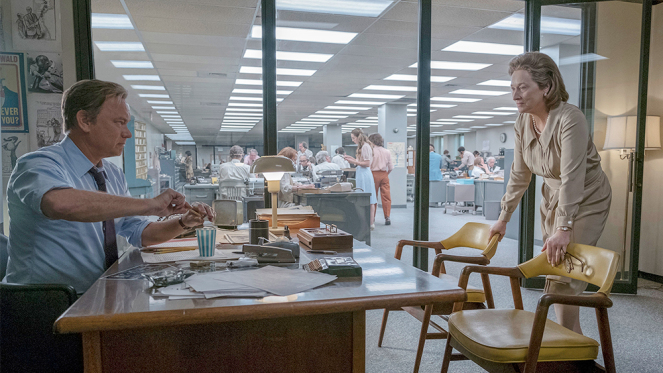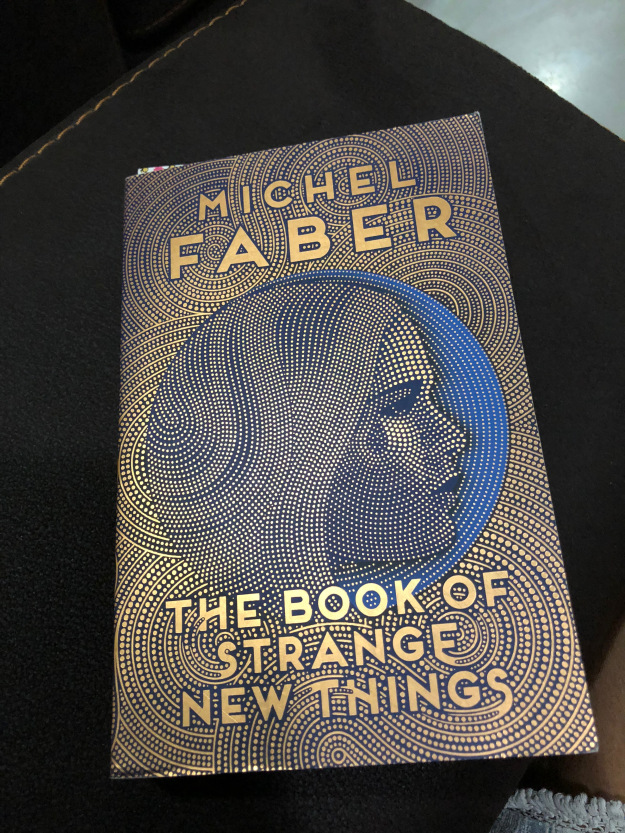 It shocks me that it took this long for Hollywood staples Meryl Streep, Tom Hanks and Steven Spielberg to make a movie together.
It shocks me that it took this long for Hollywood staples Meryl Streep, Tom Hanks and Steven Spielberg to make a movie together.
“The Post” depicts the journalists of The Washington Post in their search for the leaked Pentagon Papers in 1971, telling how the White House spent over 20 years lying about the Vietnam War. Tom Hanks stars as Ben Bradlee and Meryl Streep as Kay Graham, with the rest of the ensemble cast being filled out by Sarah Paulson, Bob Odenkirk, Bradley Whitford, Michael Stuhlbarg, David Cross, Bruce Greenwood and Matthew Rhys. Steven Spielberg directs.
“The Post” had an interesting journey to theaters. Spielberg wasn’t even attached to the project until February2017 and commissioned Josh Singer, who won an Oscar for co-writing “Spotlight,” to rewrite an original script by Liz Hannah just 10 weeks prior to filming. Photography began in May 2017 and editing finished in November, and the trailer finally dropped just a month before its limited release. It was rushed not only to meet its awards season frame but because the crew wanted it to be a topical message in response to the Trump presidency and the state of modern journalism. It could have spelled disaster for less-capable filmmakers but Hanks, Streep and Spielberg aren’t your regular filmmakers and thanks to the trio being at the top of their game, “The Post” works as a political thriller, historical period piece and decent modern social commentary.
Tom Hanks can do no wrong both in real life and in movies but he had an interesting task with this film. Playing Ben Bradlee, the editor of The Washington Post, presented a few challenges. Not only did Hanks have to try and make the character his own while staying true to Bradlee’s mannerisms but he had to compete (in a sense of the word) with Jason Robards’ Academy Award-winning turn in “All the President’s Men.” Hanks holds his weight just fine, even if he’s long-since ascended to the point of stardom where you can really only see “Tom Hanks” and he no longer disappears into a character. His Bradlee is sarcastic, witty and loyal to the truth and has those classic Hanks moments of charm that we all know and love.
In the same sense, Meryl Streep, despite her 20(!!) Oscar nominations, can only be seen as Meryl Streep. That being said her Kay Graham, owner of the Post, has a nice arc where she goes from shy and behind-the-scenes to grabbing reigns of the show. Streep has some quiet, intimate moments with the likes of Hanks and Bruce Greenwood’s Robert McNamara and they are offer a nice change of pace from the running around being done by Hanks and his crew.
The script, by Singer and Hannah, has some of the Sorkin/”Spotlight” flare with quick dialogue and characters talking over each other, seemingly having multiple conversations with themselves. The script’s flaw isn’t in its dialogue but with its characterization, as not every character gets fleshed out as much as they should and sometimes names will get tossed around and it feels like Spielberg just expects viewers to know the reporter or government official that Bradlee is referring to.
The film is topical in a few ways, both intentional and not. Despite being set in 1971 there are many parallels that can be drawn to 2017; lines like “since when should the press worry about what the president thinks about what they publish” drew laughs from my audience. However just as much as Spielberg wanted to praise how the media are crucial to the republic and criticize how what some perceive as Donald Trump mistreating them, I think he unintentionally points out the flaws of modern journalism. Bradlee and his reporters check sources, weigh the options and debate whether they are doing the right thing by publishing the classified papers; nowadays, “bombshell” reports turn out to fake and ungrounded because it’s all about being first, not correct.
This isn’t a knock against the film per se but I think that a film like this doesn’t have the same weight and punch of the likes of “All the President’s Men” did. That film took place a mere two years after Nixon’s resignation; it was fresh in audience’s minds and it was surely unnerving that something like that had been allowed to happen in their modern world. There is a scene here where Secretary of Defense McNamara tells Graham that the Pentagon Papers were meant to be studied by future generations and not reviewed in the moment. This is set 45 years in the past and we all know how Nixon treated the press and how the Vietnam War turned out so while we can play the “history repeats itself” card it doesn’t make us feel uncomfortable or challenge us. Just my random thought.
“The Post” may have just been an excuse for three of the biggest names in Hollywood’s history to finally work together, or at $50 million may just be the most expensive political ad of all-time, but either way it is a thrilling film that shows the importance of journalism and why it is important (in my opinion) we return to the state it was in back in 1971. Fans of Hanks and Streep will get their fix and so will people like myself who enjoy period pieces and even if “The Post” won’t be remembered as historically significant as “All the President’s Men” or is as modernly a call to action as Spielberg may have hoped, I think that it is a great, old-fashion time at the cinema honoring everyday working heroes of our great country.
Critic’s Grade: A–
 20th Century Fox
Advertisements
Share this:
20th Century Fox
Advertisements
Share this:




